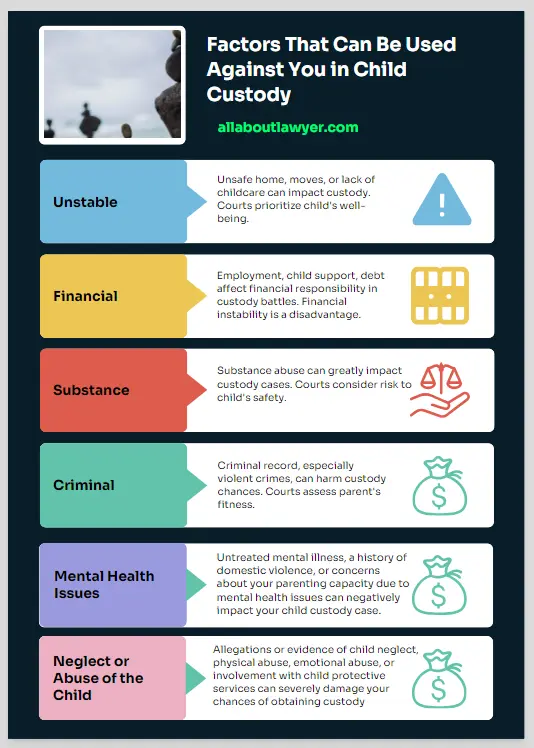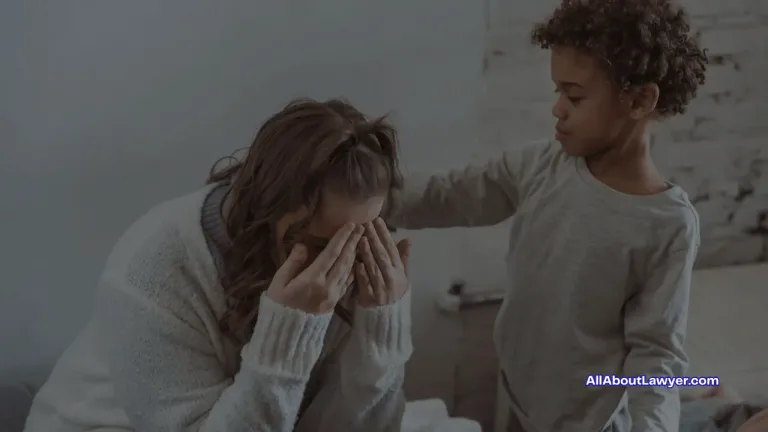What Can Be Used Against You in Child Custody Battles?
When it comes to child custody cases, being well-informed about the specific laws and factors considered in your state is crucial. Preparing a strong case that demonstrates your ability to provide a stable and nurturing environment for your child is of utmost importance so that’s why you need to know What Can Be Used Against You in Child Custody.
Table of Contents
Factors That Can Be Used Against You in Child Custody
Unstable Living Conditions
An unsafe home environment, frequent moves, or lack of proper childcare arrangements can raise concerns about the child’s well-being and that can impact your custody case. Courts prioritize the child’s best interests, and an unstable living situation may not align with that principle.

Financial Instability
Your employment history, child support payment records, and debt management skills can all play a role in determining your financial responsibility and ability to provide for the child’s needs. Financial instability could be seen as a factor working against you in a custody battle.
Substance Abuse
If you have a history of drug abuse, alcohol addiction, DUI arrests, or have not sought appropriate substance abuse treatment, it can significantly impact your child custody case. Substance abuse issues raise concerns about the potential risk to the child’s safety and well-being.
Criminal History
A criminal record, especially involving violent crimes, domestic violence, or child neglect charges, can severely damage your chances of obtaining custody. Courts closely evaluate a parent’s criminal history to assess their fitness for custody.
Mental Health Issues
Untreated mental illness, a history of domestic violence, or concerns about your parenting capacity due to mental health issues can negatively impact your child custody case. Courts may consider the potential impact on the child’s emotional well-being and your ability to provide a stable environment.
Parental Alienation
Disparaging the other parent, interfering with visitation, or exhibiting behaviors associated with parental alienation syndrome can work against you in a custody battle. Courts often frown upon attempts to alienate the child from the other parent.
Related Articls For You:
Use of Mental Health Records in Child Custody Proceedings
Does Child Support Change if the Custodial Parent Has Another Child?
If Both Parents Are on the Birth Certificate but Not Married, Who Has Custody?
Neglect or Abuse of the Child
Allegations or evidence of child neglect, physical abuse, emotional abuse, or involvement with child protective services can severely damage your chances of obtaining custody. Courts take any form of child abuse or neglect very seriously.
Protecting Yourself in a Child Custody Case
Consult with a Child Custody Attorney
So looking for guidance from an experienced child custody lawyer is crucial to understanding your legal rights and handling the complexities of child custody laws. Legal representation can significantly benefit your case and ensure your interests are protected.
Document Everything
Maintaining meticulous documentation, such as parenting plans, communication records, evidence of positive parent-child interactions, and co-parenting communication, can strengthen your case and demonstrate your commitment to the child’s well-being.
Focus on the Child’s Best Interests
Ultimately, all actions and decisions should prioritize the child’s emotional well-being, the ability to provide a stable environment, and a positive co-parenting relationship. Keeping the child’s best interests at the forefront can positively influence the outcome of your case.

Conclusion
Handling child custody battles can be complex and emotionally challenging. Understanding the factors that could potentially work against you and taking proactive steps to build a strong case is crucial for that reason you need to know that What can be used against you in child custody.
Consulting with a skilled child custody attorney, gathering relevant documentation, and focusing on the child’s best interests can increase your chances of a favorable outcome. Remember, preparation and a well-informed approach are key to protecting your rights and securing the best possible custody arrangement for your child.
Related Articles For You:
New Kentucky Child Custody Laws in KY 2024
Texas Custody Laws for Unmarried Parents
How to File for Child Custody in Texas Without a Lawyer?
FAQs
What are the most common factors courts consider in child custody cases?
Courts primarily focus on the child’s best interests, considering factors like the living situation, financial stability, parental fitness, and the child’s relationship with each parent.
Can I lose custody if I have a DUI on my record?
The potential impact of a DUI on your custody case depends on the severity and recency of the offense. It’s advisable to consult with a lawyer to understand how it may affect your specific situation.
How can mental health issues affect child custody?
Untreated mental health issues that impact your parenting abilities can be a concern for the court. However, seeking appropriate treatment and providing a stable environment can mitigate these concerns.
What evidence should I gather for my child custody case?
Document your parenting time, communication records, and anything that showcases your ability to provide a safe and nurturing environment for the child. This evidence can strengthen your case.
Is it always necessary to hire a child custody attorney?
While not mandatory, legal guidance from an experienced child custody attorney can significantly benefit your case and ensure your rights are protected throughout the process.
About the Author

Sarah Klein, JD, is a former family law attorney with over a decade of courtroom and mediation experience. She has represented clients in divorce, custody cases, adoption, Alimony, and domestic violence cases across multiple U.S. jurisdictions.
At All About Lawyer, Sarah now uses her deep legal background to create easy-to-understand guides that help families navigate the legal system with clarity and confidence.
Every article is based on her real-world legal experience and reviewed to reflect current laws.
Read more about Sarah
